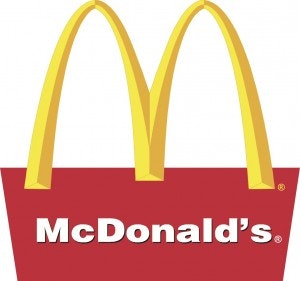
Do you want fries with that?
Over the past few years, the cost of living has increased — I know, I’m not happy about it, either. For employees making $7.25 an hour, the increase in things like gas and groceries has probably been especially onerous. So, is it valid to argue that employers should also be keeping up with the cost of living by increasing pay? Some might argue yes, while others might say no.
For those who argue yes, it might be tempting to assume that employers are greedy if they’re not increasing employee pay. But is that fair to employers? Consider the following:

Source: Bureau of Labor Statistics.
Of the total workforce in America, only 4.7% make at or below minimum wage. The above graph breaks down this 4.7% into age groups. As you can see, almost half of the total workers making at or below minimum wage are under 25. However, workers under 25 make up only one-fifth of the total U.S. workforce. This means that most people making minimum wage are high school to college age.
In addition to the above, consider this:

Source: Bureau of Labor Statistics.
This pie chart represents all the industries where workers are making at or below minimum wage. The top seven industries employ 77% of the workers making minimum wage, with the remaining 23% coming from a variety of other industries.
As you can see, leisure and hospitality make up 34%. Most of those jobs are in restaurants and other food services — like McDonald’s Corporation (NYSE:MCD), Chipotle Mexican Grill, Inc. (NYSE:CMG), Yum! Brands, Inc. (NYSE:YUM)‘ Taco Bell, and Starbucks Corporation (NASDAQ:SBUX). Consequently, if the Fair Minimum Wage Act is passed, it’ll have the biggest impact on fast-food and restaurant companies.
Yum! A lukewarm, gray burger that’s mostly just bun
Fast-food chains are successful because of their focus on high-volume, low-cost food. But even that low-cost food has seen a price jump thanks to increased supply chain cost. Take for example a Big Mac from McDonald’s Corporation (NYSE:MCD). At the end of the recession, the average price in the U.S. for a Big Mac was $3.57. Today, it’s $4.37.
This trend is expected to continue. In its 2012 Annual Report, McDonald’s Corporation (NYSE:MCD) reported that in 2013, it expects to spend 1.5% to 2.5% more on groceries in the U.S. Furthermore, in 2012 McDonald’s Corporation (NYSE:MCD) reported that even though there were positive comparable sales, profit margin decreased due to “higher commodity and labor costs.” More importantly, McDonald’s Corporation (NYSE:MCD) profit margin decreased because it kept prices low despite escalating costs. It focused on keeping prices low — and continues to do so — because fewer people are eating out, according to the Harris Poll.
To top that off, the poll reported that 90% of respondents said “good prices” were the primary factor in where they dined. Additionally, 26% of respondents said they were eating at fast-food restaurants “less frequently,” while only 14% reported “more frequently.”
A look in the crystal ball
What all this boils down to is the fact that restaurants, particularly fast-food joints, are already feeling the pinch thanks to increased supply chain cost and weaker consumer spending. Also, they employ a large portion of workers at minimum wage. Furthermore, most of the people working at these places are high school and college age, and probably not looking for a career in fast food. This likely leads to a higher turnover rate.
Consequently, if the Fair Minimum Wage Act is passed, there’s a good chance companies like McDonald’s Corporation (NYSE:MCD), Chipotle Mexican Grill, Inc. (NYSE:CMG), Taco Bell, and Starbucks Corporation (NASDAQ:SBUX) will be forced to raise prices, which will likely impact consumer spending. For investors, that’ll mean a loss in profits, leading to a negative impact on stock prices.
Time to toss the wrapper?
Right now, the Fair Minimum Wage Act could go either way, but I imagine — or at least hope — that representatives are considering all the factors. Yes, living on $7.25 an hour probably makes it hard to make ends meet, but at the same time, most of the workers in this situation aren’t facing the full expenses of “adulthood.” In addition, employers in fast-food chains are probably weighing a variety of factors, and not simply being greedy. Therefore, if employers are forced to raise minimum wage for everyone, I imagine it’ll prove costly to their bottom line. In turn, that’ll probably negatively impact the stock price. As such, investors would do well to continue monitoring the progress of the Fair Minimum Wage Act. If it looks like it will pass, it might be a good idea to reevaluate your holdings.
The article Could Obama’s Latest Push Send McDonald’s Stock Tumbling? originally appeared on Fool.com and is written by Katie Spence.
Fool contributor Katie Spence has no position in any stocks mentioned. Follow her on Twitter @TMFKSpence. The Motley Fool recommends and owns shares of Chipotle Mexican Grill, McDonald’s, and Starbucks.
Copyright © 1995 – 2013 The Motley Fool, LLC. All rights reserved. The Motley Fool has a disclosure policy.

